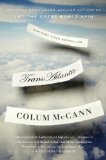Summary | Excerpt | Reading Guide | Reviews | Beyond the Book | Readalikes | Genres & Themes | Author Bio

A Novel
by Colum McCann
BROWN WAS SHIPPED home before the armistice, then lost his hat high in the air over Piccadilly Circus. The girls wore red lipstick. The hems of their dresses rose almost to their knees. He wandered along the Thames, followed the river until it crawled upwards to the sky. Alcock didn't make it back to London until December. He watched men in black suits and bowler hats pick their way amid the rubble. He joined in a game of football in an alley off the Pimlico Road, knocking a round pigskin back and forth. But he could already sense himself aloft again. He lit a cigarette, watched the smoke curl high and away.
WHEN THEY MET for the first time in the Vickers factory in Brooklands, in early 1919, Alcock and Brown took one look at each other and it was immediately understood that they both needed a clean slate. The obliteration of memory. The creation of a new moment, raw, dynamic, warless. It was as if they wanted to take their older bodies and put their younger hearts inside. They didn't want to remember the bombs that had dudded out, or the crash or burn, or the cellblocks they had been locked into, or what species of abyss they had seen in the dark.
Instead they talked about the Vickers Vimy. A nippy little thing.
THE PREVAILING WINDS blew east from Newfoundland, pushing hard and fast across the Atlantic. Eighteen hundred miles of ocean. The men came by ship from England, rented rooms in the Cochrane Hotel, waited for the Vimy to arrive at the docks. It came boxed in forty-seven large wooden crates. Late spring. A whip of frost still in the air. Alcock and Brown hired a crew to drag the crates up from the harbor. They strapped the boxes to horses and carts, assembled the plane in the field.
The meadow sat on the outskirts of St. John's, on a half-hill, with a level surface of three hundred yards, a swamp at one end, and a pine forest at the other. Days of welding, soldering, sanding, stitching. The bomb bays were replaced by extra petrol tanks. That's what pleased Brown the most. They were using the bomber in a brand-new way: taking the war out of the plane, stripping the whole thing of its penchant for carnage.
To level out the meadow, they crimped blasting caps to fuses, shattered boulders with dynamite, leveled walls and fences, removed hillocks. It was summertime but still there was a chill in the air. Flocks of birds moved fluidly across the sky.
After fourteen days the field was ready. To most people it was simply another patch of land, but to the two pilots it was a fabulous aerodrome. They paced the grass runway, watched the breeze in the trees, looked for clues in the weather.
CROWDS OF RUBBERNECKERS flocked to see the Vimy. Some had never ridden in a motorcar, let alone seen a plane before. From a distance it looked as if it had borrowed its design from a form of dragonfly. It was 42.7 feet long, 15.25 feet high, with a wingspan of 68 feet. It weighed 13,000 pounds when the 870 gallons of petrol and the 40 gallons of oil were loaded. Eleven pounds per square foot. The cloth framework had thousands of individual stitches. The bomb spaces were replaced by enough fuel for 30 hours of flying. It had a maximum speed of 103 miles per hour, not counting the wind, a cruising speed of 90 mph and a landing speed of 45 mph. There were two water-cooled Rolls-Royce Eagle VIII engines of 360 horsepower and a turnover rate of 1,080 revs per minute, with twelve cylinders in two banks of six, each engine driving a four-bladed wooden propeller.
The onlookers ran their hands along the struts, tapped the steel, pinged the taut linen of the wings with their umbrellas. Kids crayoned their names on the underside of the fuselage.
Photographers pulled black hoods over their lenses. Alcock mugged for the camera, shaded his hand to his eyes like an ancient explorer. Tally-ho! he shouted, before jumping the nine feet to the wet grass below.
Excerpted from TransAtlantic by Colum McCann. Copyright © 2013 by Colum McCann. Excerpted by permission of Random House, a division of Random House, Inc. All rights reserved. No part of this excerpt may be reproduced or reprinted without permission in writing from the publisher.
Your guide toexceptional books
BookBrowse seeks out and recommends the best in contemporary fiction and nonfiction—books that not only engage and entertain but also deepen our understanding of ourselves and the world around us.